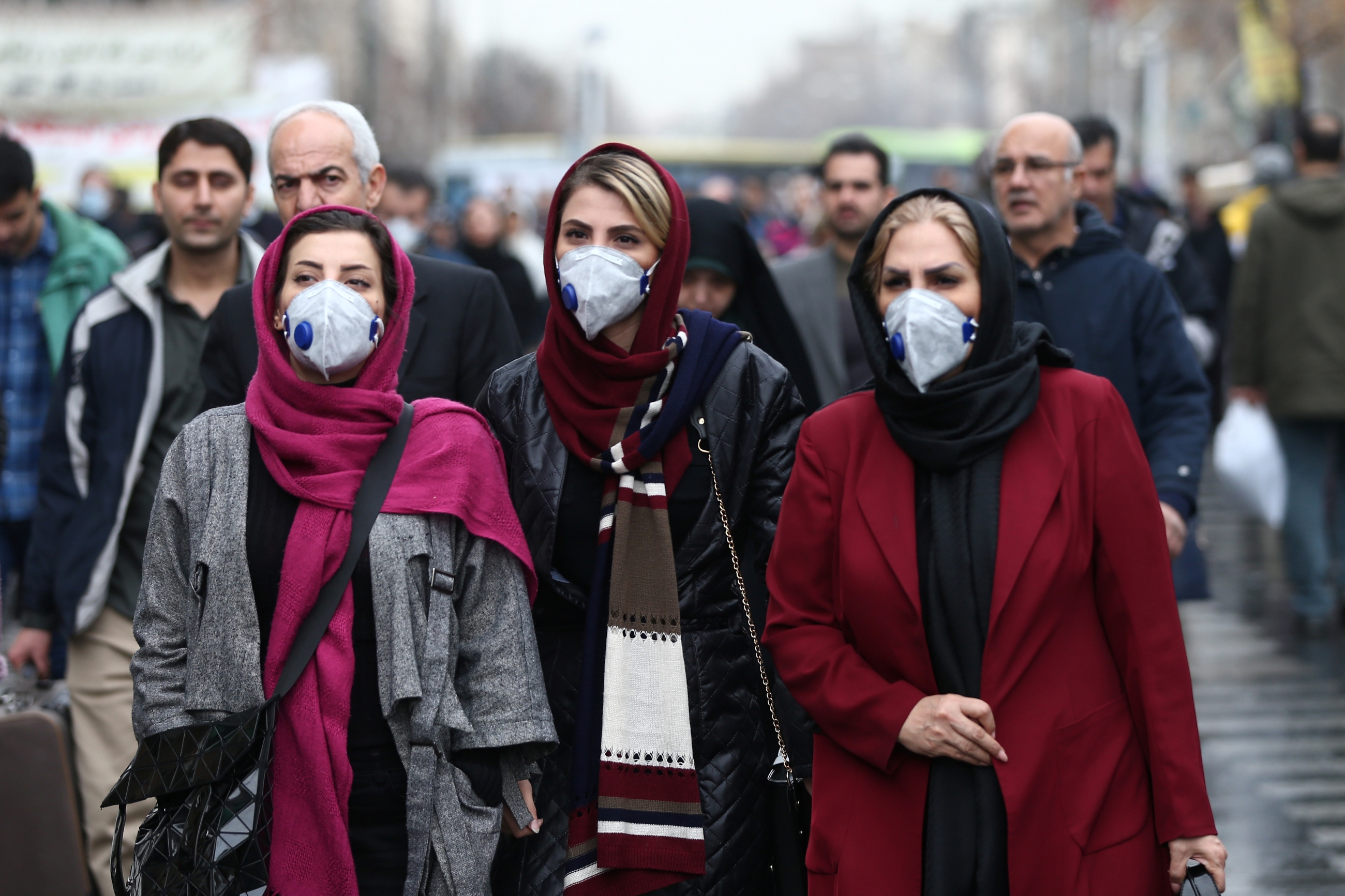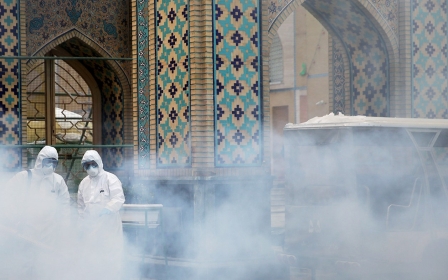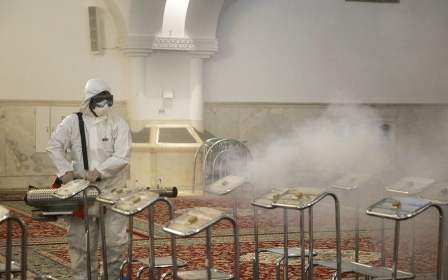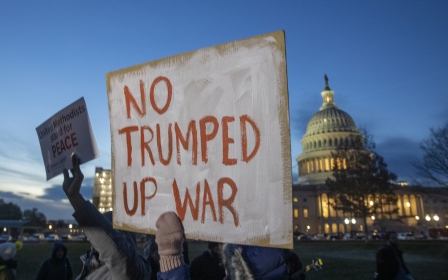Iranian press review: Corruption hinders Iran’s response to coronavirus outbreak

Corruption hinders response to coronavirus outbreak
A well-connected network is controlling the distribution of protective masks and sanitation products in Iran as the country struggles to deal with an outbreak of COVID-19, officials warned. Iran has the highest coronavirus cases in the Middle East.
Saeed Namaki, Iran’s health minister, asked President Hassan Rouhani in an open letter published by local media:
“How is it possible that this opportunist network announces that in 24 hours they can provide 200 million masks?”
The minister did not elaborate on the identity of the network’s leaders.
Stay informed with MEE's newsletters
Sign up to get the latest alerts, insights and analysis, starting with Turkey Unpacked
Namaki said that officials in the health ministry had been working hard to provide the needed products, but they did not have enough power to overcome the hoarders, Mehr news agency reported.
Face masks, disinfectant gels and alcohol have been in high demand in Iran, and the price of these products have been hiked up in drugstores since the beginning of the coronavirus outbreak.
As of Thursday, the number of diagnosed cases for the coronavirus in the country had reached 3,513, with the death toll rising to 107.
Iran has reported a higher deaths-to-infections ratio when compared to other countries, sparking fears that the number of people infected may be higher than current figures show.
Ahmad Tavakoli, a conservative politician and a former lawmaker, in a separate letter to Iran’s judiciary chief, called for stricter measures to stop the network, according to IRNA news agency.
He claimed that the network, which controls the price of face masks and sanitisers, would not be able to operate without the help of influential authorities.
“Two or three simple middlemen cannot provide 200 million masks without being connected to those who hold the power,” he wrote in his letter, referring to the numbers mentioned in health minister’s letter.
Iran closed down schools and universities on Thursday for a month to prevent a further spread of the new coronavirus disease, as the death toll from the virus continues to rise across the country.
Iranian authorities, however, have ruled out quarantining the city of Qom, which has become the epicentre of the virus in the Middle East.
Rouhani said on Wednesday that "almost" all of Iran's provinces have seen coronavirus cases.
New space programme details revealed
The head of the Iranian Space Research Center (ISRC) has revealed the details of two recently designed satellites and a new system of transfer orbit, the semi-official news agency ISNA reported.
Saeid Samimy told ISNA that “Pars 1” and “Nahid 2” are the two satellites which have been designed at ISRC.
Pars 1 is a remote sensing satellite, and Nahid 2 would be used as a telecommunications satellite.
Last Friday, Samimy said that the ISRC had developed a new generation of solid fuel engine for satellite orbital transfer in space, and would test it in 10 days’ time.
This engine is named “Arash”, and the new orbital transfer system in which Arash would be acquired is called “Saman 1”.
Since the founding of the Iranian Space Agency in 2004, Iran has been working on an ambitious space programme. Western powers have accused the country of using satellite launches to develop its missile programme, a claim which has been rejected by Iranian officials.
Iran’s most recent attempts to send satellites into orbits were unsuccessful. In February, Iran’s “Zafar” satellite failed to reach orbit, and in September an explosion took place at one of its satellite launch pads in Semnan province.
Iran's space programme unsettles some western nations because the technology used in space-bound rockets can also be used in ballistic missiles.
US officials say they fear long-range ballistic technology used to put satellites into orbit could also be used to launch nuclear warheads.
Tehran says it has never pursued the development of nuclear weapons and that its missile programme is solely defensive.
Washington reimposed sanctions on Iran after President Donald Trump in 2018 pulled the United States out of the 2015 nuclear deal between Tehran and six world powers.
Under that deal, Tehran had curbed its nuclear programme in exchange for the lifting of international economic sanctions.
Still, Trump said the agreement was flawed because it was not permanent, did not involve what Washington considers Iran's meddling in regional countries and did not address Iran’s missile programme.
Iranian rial in downward spiral after FATF blacklisting
Iran’s currency has lost more value over the last week, falling to 158,000 rials against the US dollar at local exchange centres in Tehran, Moj News reported.
The latest decline of the rial comes after the global dirty money watchdog, the Financial Action Task Force (FATF), in February placed Iran on its blacklist for failing to comply with international anti-terrorism financing norms.
Iran had previously been blacklisted by the FATF in 2008, and then in 2012-15.
FATF is an inter-governmental organisation based in Paris created by the G7 countries with the aim of combating money laundering and funding terrorism.
In 2016, the organisation gave Iran several deadlines to implement the organisation’s recommendations to its banking system. Iran’s action plan to meet with the FATF requirements expired in January 2018.
Iranian parliament passed the legislation to implement FATF’s recommendations. However, the country’s hardline Guardian Council rejected the legislation.
According to Iranian conservatives, while the country’s banking system is already under international sanctions, FATF cannot provide any relief to Iran’s troubling economy or add more complications to its banking system.
Reacting to the FATF latest blacklisting, Foreign Minister Mohammad Javad Zarif appeared resigned and accused the US of using its maximum pressure campaign to exert influence at the FATF.
Iran’s banking system has been cut off from the global monetary system following the 2018 US sanctions.
Disqualified candidate seeks answer following elections
Nearly two weeks after Iran’s parliamentary elections, questions are still being raised about the massive and unprecedented disqualification of reformist and moderate candidates ahead of the vote.
Conservatives and supporters of former president Mahmoud Ahmadinejad won a landslide victory in the 21 February elections.
In an interview with Arman daily, Iran-Iraq war veteran Gholam Ali Jafarzadeh said that he had no answer for people who asked him why he was barred from entering the race.
“A decision was made before the elections to prevent a group of sitting legislators from being in the new parliament,” said Jafarzadeh, who is disabled and in a wheelchair, without explaining who had made this decision.
However, the country’s Guardian Council is the entity responsible for vetting the candidates entering all elections in Iran.
Jafarzadeh, like many other Iranian politicians and analysts, believes that the hardliner-dominated new parliament will attack President Hassan Rouhani’s administration when the new lawmakers begin their term in May.
“During the elections campaigns, most conservatives focused on attacking the government, which means with the start of the new parliament, they will continue such attacks,” he explained.
About half of the 16,000-odd candidates were barred from participating in the February elections. Among them were many reformists and moderates, including dozens of sitting lawmakers, leaving conservatives with virtually no competition.
* Iranian press review is a digest of reports that are not independently verified as accurate by Middle East Eye
Middle East Eye delivers independent and unrivalled coverage and analysis of the Middle East, North Africa and beyond. To learn more about republishing this content and the associated fees, please fill out this form. More about MEE can be found here.




